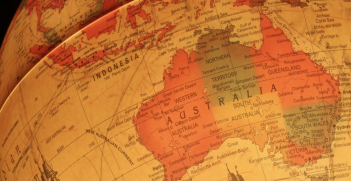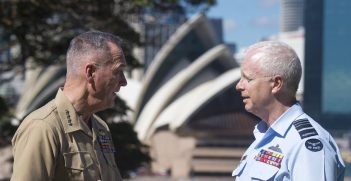New Agendas for a New Era: The AIIA National Conference 2019

Experts will be tackling new and emerging international issues in an Australian context at the October 14 AIIA National Conference 2019. Sino-American rivalry, technological development and environmental concerns are up for discussion.
Minister for International Development and the Pacific Hon Alex Hawke MP, Shadow Minister of Foreign Affairs Senator the Hon Penny Wong and former Director General of the Office of National Assessments and current AIIA National President Allan Gyngell will kick off the 2019 AIIA National Conference, in a keynote session chaired by AIIA National Vice President Zara Kimpton. The conference, titled “New Agendas for a New Era,” will examine Australia’s place in a more intense regional environment, and the impact of technological development and a changing planet on diplomacy, prosperity and security.
Information about the conference line up and tickets are available now at aiia19.org. Registration opens at 8am on 14 October, and the conference will run to 5:30pm at the Hotel Realm in Canberra.
A New Cold War
The first panel of the conference will examine growing enmity between the US and China and Australia’s place within it. The leadership of the United States has recently made no secret of its view that China is contesting American geopolitical advantage and attempting to change the world order in its favour. In October 2018, the New York Times characterised a speech given by US Vice President Mike Pence, where he discarded the normal diplomatic niceties for a bluntly critical assessment of China’s behaviour, as a “Portent of a ‘New Cold War.’” Such Cold War references in the media and elsewhere have increased since.
However, is “Cold War” the correct term to define emerging relationships between great powers? How will Australia manage its relations between China, an important economic partner, and the United States, its security guarantor, in times of tension? And how can Australia work with like-minded partners in the region to increase its diplomatic options in a period of Sino-American enmity? What are the regional implications of tension between the United States and China?
La Trobe University’s Nick Bisley will moderate the panel featuring Macquarie University’s Bates Gill, James Laurenceson from the Australia-China Research Institute, UNSW’s Pichamon Yeophantong and the US Studies Centre’s Ashley Townshend.
New Technologies
Panel two will look at how technology is changing foreign affairs, diplomacy and trade. Technology has always had the capacity to both enhance and disrupt prosperity and security. The disruptive potential of new media, for example, was evident in the terrorist attacks in Christchurch, New Zealand, and in Sri Lanka earlier this year. These have highlighted how social media platforms can be used to amplify terror, but are Australian responses to this problem adequate? Meanwhile, technological advantage has always been a goal in defence planning, but how is rapid technological development changing the way we think about conflict? What innovations are changing global trade and how can Australia harness these to its advantage? How can Australia ensure that its government and business processes are secure amid rapid developments in communications?
The panel will feature Anne Aly MP, the Australian Civil Military Centre’s Alan Ryan, the Australian National University’s Darren Lim and Macquarie Telecom’s Aidan Tudehope. It will be moderated by AIIA NSW Vice President Thom Dixon.
The Health of the Planet
The third panel will tackle environmental challenges and their impact on international affairs. Many of these challenges threaten Australia’s security, prosperity and its position in the international community. How can nation states cooperate effectively to address the tragedy of the commons? Is Australia innovating in green and adaptive technologies and what does this mean for its position in the global economy? How can Australia better protect ocean health and biodiversity? Meanwhile, new diseases, often emerging in temperate climates, present a problem in Australia’s near abroad and are now viewed explicitly as a security problem by the Australian government. How can Australia work to increase resistance to pandemics in the region, so they don’t become an issue at home?
Former Director of the Australian Antarctic Division Tony Press, Australian Institute of Marine Science Chair the Hon Penny Wensley, CSIRO Growth and Innovation Director Nigel Warren and Griffith University’s Sara Davies will feature on the panel on the Health of the Planet. It will be moderated by AIIA Tasmania President Kim Boyer.
The conference will be rounded out by journalist and Australian Strategic Policy Institute Fellow Graeme Dobell and AIIA National Executive Director Bryce Wakefield.
Information about the conference line up and tickets are available now at aiia19.org.





